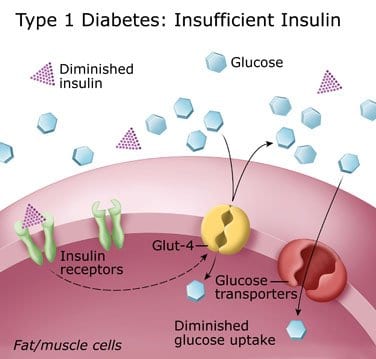When a diabetic hears the term ‘brittle’ it indicates a fragile situation that may result in a break. Some understand that arteries in diabetics can become brittle resulting in the need for a heart bypass in many diabetics. This, however, is not the origin of the term ‘Brittle’ diabetes.
What is Brittle Diabetes?
In order to understand this issue we turned to MedicineNet.com to provide a definition, “[Brittle diabetes is] a type of diabetes when a person’s blood glucose (sugar) level often swings quickly from high to low and from low to high. Also called “unstable diabetes” or “labile diabetes.”
Brittle diabetes is very rare. Less then 1 percent of Type 1 diabetics are diagnosed with the disease. Brittle diabetic patients spend a remarkable amount of time in the hospital and the onset of this medical condition may be caused by either psychological issues or unrelated health concern that may appear to have no specific origin.
Psychology and Brittle Diabetes
Most individuals who are diagnosed with Brittle diabetes also struggle with issues of depression. This results in a mood variant that may find the patient either resisting or forgetting their managed care plan. As the patient becomes more affected by blood sugar as well as mood swings they may require hospitalization to regulate their diabetes.
Most doctors can diagnose the psychological aspect of Brittle diabetes when the patient responds very well to normal diabetes medications and care within a hospital setting. This may provide the doctor with a clue about the management of depression in an effort to allow the patient to care more personally about their health objectives.
When Depression is Not the Source
When the incidence of blood sugar swings seems to fit no discernable pattern and even hospitalized care provides less then desired control this is when a doctor will truly label the patient as a Brittle diabetic.
In these individuals even small adjustments in their life can create huge swings in blood sugar. While they compensate for one swing they may unintentionally cause their diabetes to swing hard in the other direction. This is why this type of diabetic is hospitalized more than others.
The Stomach and Hormones
Gastrointestinal absorption problems, which include drug interactions, hormonal malfunction; insulin absorption issues and gastroperisis can also cause brittle diabetes. Gastroperesis can affect the absorption of food, insulin and glucose that flows into the blood stream. Thyroid and adrenal glands can also be affected.
Ruling out Self-Management as a Cause
The first step to taking care of your diabetes is diet and exercise. This is perhaps one of the most important steps in taking care of your diabetes. If you can keep these two under control you can help doctor’s eliminate poor control as the cause of any substantial glucose swings you may encounter.
Who Develops Brittle Diabetes
Usually brittle diabetes only affects people 15 to 30 years of age. However a much smaller number of elderly men and women have also been diagnosed with Brittle diabetes. Treatment of Brittle diabetes includes a hospital visit. These visits can last as long as three weeks. You will be monitored very closely when in the hospital and may even receive a visit from a staff psychologist who will work at eliminating depression as a cause for your discomfort.
Dealing with A Brittle Swing
You should visit to your doctor or a medical treatment facility immediately if you find your blood sugar numbers are fluctuating significantly. Never think it will just go away on its own. Hospitalization may be your only viable option. Never hesitate even if you think you think you are overreacting. Your health may depend on early intervention.
